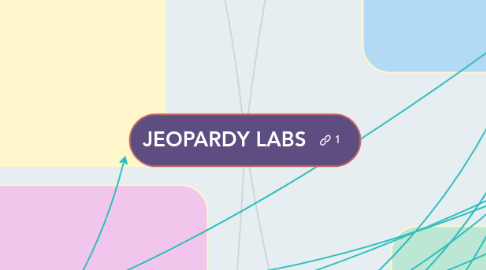
1. Learning Goals
1.1. Create
1.1.1. Writing
1.1.1.1. CCSS.ELA-LITERACY.W.9-10.1
1.1.1.2. CCSS.ELA-LITERACY.W.9-10.2.D
1.1.1.3. CCSS.ELA-LITERACY.W.9-10.4
1.1.2. Research
1.1.2.1. CCSS.ELA-LITERACY.RL.9-10.1
1.1.2.2. CCSS.ELA-LITERACY.L.9-10.1
1.1.3. Collaboration
1.1.3.1. CCSS.ELA-LITERACY.SL.9-10.1.B
1.1.4. Technology
1.1.4.1. CCSS.ELA-LITERACY.W.9-10.6
1.2. Play
1.2.1. Speaking and Listening
1.2.1.1. CCSS.ELA-LITERACY.SL.9-10.4
1.2.1.2. CCSS.ELA-LITERACY.SL.9-10.1.A
1.2.2. Discussion
1.2.2.1. CCSS.ELA-LITERACY.SL.9-10.1
2. Learning Assessment
2.1. Understanding Content
2.1.1. Concepts
2.1.1.1. Application of Concepts
2.1.1.1.1. By using specific question, Jeopardy Labs allow students to try to understand the concepts by making the students thing how these concepts are applied. Understanding how a concept shows how they understand the basics of definitions and concepts.
2.1.2. Definitions
2.1.2.1. Knowing definitions
2.1.2.1.1. Knowing definitions is a key aspect shows how students are able to retain the basis of all knowledge before applying it. From there, it can go to towards applying these definitions as concepts.
2.1.3. Knowledge
2.1.3.1. Logic
2.1.3.1.1. Understanding how things relate to each other.
2.1.3.2. Semantic
2.1.3.2.1. Understanding language
2.2. Collaboration
2.2.1. Teamwork
2.2.1.1. Teamwork requires students to work together, even if they happen to not be able to get along
2.2.2. Communication
2.2.2.1. Students are required to communicate in order to overcome possible obstacles
2.2.2.1.1. Compromises
2.2.2.1.2. Helping Each Other
2.3. Reinforcement
2.3.1. Of Content
2.3.1.1. Can be used as a review so students are exposed to the material as a whole in a fun way.
2.3.2. Key points
2.3.2.1. Putting Questions about key points makes students aware about what is important about their subject.
3. Learning Activities
3.1. English Categories
3.1.1. Parts of a stories plot line
3.1.2. Figurative language
3.1.2.1. ex:simile, personification.
3.1.3. Conflict
3.1.3.1. ex:(man vs. self or man vs. man)
3.1.4. Prefixxes and suffixes
3.1.4.1. The meaning is presented and they answer with the correct suffix or prefix that corresponds.
3.1.5. Synonyms and Antonyms
3.1.5.1. Two words are shown and the students must answer with whether it is a Synonyms and Antonyms.
3.1.6. parts of speech( when its is used)
3.1.6.1. Words are given and the answer is what part of speech it is. (ex:prepositions, nouns and verbs)
3.2. Individual Work
3.2.1. Students are asked to construct questions and answers on their own using their iPads and the teacher will plug them into the Jeopardy Labs game that the entire class can use.
3.2.1.1. Students construct sentences that have mistakes in them and the answer will be to spot out the mistake within the sentence. The mistakes(punctation, capitalization, word use) will have categories based on the mistakes that are in the sentence.
3.2.1.2. Students write questions regarding the book the class is reading to practice reading comprehension.
3.3. Group Work
3.3.1. As a class,one day a week the students raise there hand and ask any questions or things that they are confused on in their English lessons.
3.3.1.1. The teacher then take the questions and the concepts that the students wrote down and makes a jeopardy lab that will be used as a review for the next day.
3.3.1.1.1. This way of review will clear up any confusion among the class as well as a good chance to review with everyone.
3.3.1.1.2. Students can get into groups and play the game against each other.
4. Teacher Roles
4.1. Creating
4.1.1. Use lesson plans to make appropriate questions and answers
4.1.1.1. Concepts including definitions, spelling, fixing incorrect sentences, grammar and puncuation
4.1.2. Different jeaporady labs for different concepts in unit
4.2. Organizing
4.2.1. Keeping score of each group during games
4.2.2. Keeping track of which labs go for which unit
4.3. Instructing
4.3.1. During game play
4.3.2. During set up and explanation
4.3.3. During confusion
4.3.3.1. If student is confused by why an answer is the way it is
4.3.3.2. If student does not understand how jeopardy works
4.4. Cheering
4.4.1. Being a positive influence
4.4.2. Keeping the game fair and fun
4.4.3. Light-hearted, not a competition
4.5. Rewarding
4.5.1. Groups or individual students will recieve prizes if they win a certain round of jeaporady
4.5.1.1. Motivating prizes
4.5.1.1.1. Free homework pass, extra credit points
